

To kick off my error message “hall of shame” series, I thought I should share my all-time favorite. I got this one many years ago, I was minding my own business and suddenly this pops up in the middle of my screen:

I did not have the presence of mind to take a screenshot back then, so this is “faked” from memory, but all the essentials are here: An empty title bar, so I have no idea which program generated the error, the “unknown error” deepens the mystery and the “ok” button serves as a cruel, taunting punchline.
I never figured out which program issued this error, everything seemed to continue normally. Great mysteries, indeed.
The Oct 9th issue of New Scientist had an article titled “Eating Skippy?” written by a now, former vegetarian about the merits of eating the flesh of Kangaroos.
I like to think of former vegetarians (and vegans) more as “born-again meat eaters”. Like some born-again Christians, they often hang onto a pile of partly-understood rationalizations for what they are doing, believe they have discovered absolute truth, and won’t shut up.
Fortunately the author of this article doesn’t seem to be one of these. Her article seems to be pretty compelling, but in the end it shows that if you do something for the wrong reason, it won’t stick.
There are a number of reasons one might become vegan: for health benefits, for reducing environmental impacts, to imitate a celebrity (that’s what PETA counts on), for animal welfare or for animal rights. The problem is that all reasons except the last one are arguable, and only a few rationalizations from vanishing.
The article does show that Kangaroos consume less water and food and produce fewer greenhouse gasses than other animals. Oops! there goes the environmental arguments. She also shows that flesh is more healthy than that of other animals. There goes the health reasons.
Kangaroos are very easily stressed, and that stress ruins the taste of their flesh. Therefore they can’t be confined and must be free-range; they can only be hunted in the most stealthy manner, which means they know nothing of their fate until the moment the bullet enters their skull. And there goes the animal welfare reasons.
The article does mention “animal rights” at a few points, but, as is so often the case, it ends up confused with “animal welfare”. Here are the two mentions of “animal rights”: “Many animal rights groups remain opposed to kangaroo harvesting, saying it is cruel…” and “Animal rights groups, such as Australia’s Voiceless, say any orphaned young at foot will starve to death.” This shows that most groups which use the phrase “animal rights” are really welfarist groups. And, while I don’t know if the author intended this, these statements are strawmem: by using the phrase “animal rights” but then bringing up welfare concerns, which are easily dealt with (q.v.), the implication is that the animal rights concerns can be dismissed.
But the animal rights argument is straightforward: Kangaroos are sentient beings and we have no right to kill them. But that wouldn’t fill four pages of a magazine, now would it?
There’s an old joke told many years ago by those who didn’t like Unix:
Ken Thompson has an automobile which he helped design. Unlike most automobiles, it has neither speedometer, nor gas gauge, nor any of the numerous idiot lights which plague the modern driver. Rather, if the driver makes any mistake, a giant “?” lights up in the center of the dashboard. “The experienced driver”, he says, “will usually know what’s wrong.”
I’m sure the early versions of ed inspired this. Though in those days, when every byte counted, a certain level of terseness was understandable. And the software was simple enough that there were a limited number of things which could be going wrong.
But now our computers are orders of magnitude bigger and more complicated. We have layer upon layer of drivers, libraries and applications, which nobody can understand in their entirety. And we still have a giant “?” lighting up on our dashboard. The combination of sloppy (or nonexistent) error handling and poor error reporting, means that we all encounter incomprehensible or meaningless out-of-context error messages on a regular basis. Increasingly, I feel that this is the key problem with computers these days: we expend much of our time, energy and morale to the struggle of figuring out what the latest incomprehensible error message means.
Therefore, I will be devoting some time here to cataloging terrible error messages I run into and some of the bad programming practices that lead to them. I thought I should provide some warning (and context) before I vent my spleen.
I just migrated this site to Laughing Squid’s new cloud hosting and upgraded WordPress. I’ve been hoping to get this blog going again, as I have a bunch of rants bottled up, but it has been a very busy year: My daughter just turned two, we moved across the country last year and the house has needed a lot of work.
I debated setting up separate blogs for the different topics of concern to me, but I figured that’s just too much work, so there will be an odd mix of topics here including: veganism (from an abolitionist viewpoint), bicycling, gardening and various computer programming topics.
Considering this is my first post pretty much since my daughter was born, I’m sure I’m talking to an empty room. That’s ok, I’m used to it. But this post at least will explain the long gap and the change in focus.
Since there isn’t much traffic on 124th Avenue and it doesn’t generally go anywhere useful, Bellevue decided to put a bike lane on it. That isn’t quite fair. There numerous houses in that neighborhood, so if you live there and are commuting into downtown here’s the baffling situation which will greet you as you approach 8th Street. Rather than do something logical, like put up a sign that says “bike lane ends” and simply stop the lane marker, they chose to instead force cyclists towards the curb, twice! Since the bike lane marker doesn’t end properly, car drivers get no indication that they may actually need to expect bicyclists to merge with traffic in order to get to the intersection with 8th St, so they zoom right past blissfully ignorant of your plight. So really, this bike lane translates to “get off the road”, but that title would get monotonous.
NE 8th Street is pretty frightful place to ride, with the worst part being the I-405 overpass which I generally call a “wrongful death lawsuit waiting to happen”. Fortunately for the inevitable victims, Overlake Hospital is right next door. But once you get to the other side of the freeway there are fragments of bike lane! One helpfully appears on the westbound side at 120th Ave, right as you begin scaling a steep hill. But once you get to the top, around 123rd, the bike lane gradually loses about 1 foot of its width, which means you’re just a hair’s breadth away from the Mercedes SUVs piloted (to use the term very loosely) by the gesticulating, bluetooth enabled maniacs.
Something tells me that with my bike buckets and produce box (see photo), I’m wider than that lane. Retreat to the sidewalk!
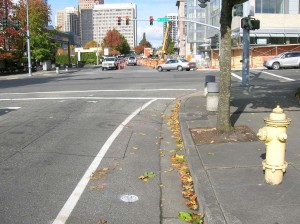 Our oh so brief sojourn down 106th Ave comes to an abrupt end at 4th Street. Of course it isn’t enough to simply bring the bike lane to an end, but to re-assert the God-given supremacy of the automobile. Rather than just paint the line straight to the crosswalk, they swerve the line over, squeezing cyclists and making it rather hard to continue up 106th Ave. The implication is that you should instead, turn right… though watch out for the Hummer taking advantage of those extra couple of inches to accommodate their bulk as they proceed around the corner.
Our oh so brief sojourn down 106th Ave comes to an abrupt end at 4th Street. Of course it isn’t enough to simply bring the bike lane to an end, but to re-assert the God-given supremacy of the automobile. Rather than just paint the line straight to the crosswalk, they swerve the line over, squeezing cyclists and making it rather hard to continue up 106th Ave. The implication is that you should instead, turn right… though watch out for the Hummer taking advantage of those extra couple of inches to accommodate their bulk as they proceed around the corner.
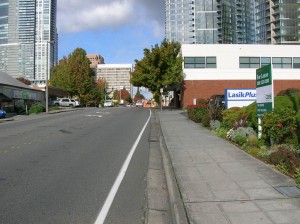 As we labor up the hill on 106th Ave NE, towards 4th street we are presented with this odd situation: for no readily apparent reason, the bike lane briefly shrinks to about 1 foot wide, and then back again. I suddenly remember yoga class. Inhale! Hold! Exhale!
As we labor up the hill on 106th Ave NE, towards 4th street we are presented with this odd situation: for no readily apparent reason, the bike lane briefly shrinks to about 1 foot wide, and then back again. I suddenly remember yoga class. Inhale! Hold! Exhale!
We continue south on 106th Ave NE towards Main Street, and here we are greeted an opportunity to do a magic trick! Make a bicyclist disappear, which is the apparent intent of this bike lane as in gradually narrows into nothingness.
It is too bad the bike shop moved from the storefront on the right, as they were conveniently located to commence repairs on bikes whose riders did not succeed in the vanishing trick, and instead ended up in the lane with the drivers, who, around here, don’t tend to notice cyclists until they bounce off their windshield.
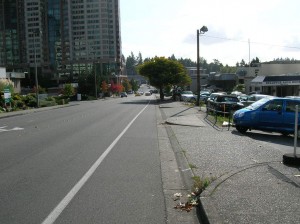 More so than the rest of Bellevue, downtown has almost no bike facilities. However, on 106th Avenue between 4th and 2nd something resembling a bike lane can be found! Something unique in downtown. But, like so many of the other bike lanes I’ve been talking about, I think this one was another “accidental” bike lane: there was extra space on the pavement so they painted lines which resemble bike lanes and lull us into a false sense of security, for we shall soon be disappointed.
More so than the rest of Bellevue, downtown has almost no bike facilities. However, on 106th Avenue between 4th and 2nd something resembling a bike lane can be found! Something unique in downtown. But, like so many of the other bike lanes I’ve been talking about, I think this one was another “accidental” bike lane: there was extra space on the pavement so they painted lines which resemble bike lanes and lull us into a false sense of security, for we shall soon be disappointed.
In this case, what starts as a nice bike lane slowly loses about 1 foot of it’s width, with the narrowest being right where a tree encroaches onto the street. The tree has been pruned in an odd structure, which ensures that car drivers will pass unmolested, but cyclists will need to duck at the moment traffic is forced closest.
This is the latest capitulation to the automobile taking place in Bellevue: They have decided to widen NE 8th Street, for two blocks! I am uncertain how these two blocks will do anything for the unfixable traffic situation, other than move the head of the traffic jam two blocks farther along.
Also, look closely at the building in the middle of the picture and the distance between it and the new curb. Somehow, I doubt a usable sidewalk can be put there.
A long time ago, city hall made the decision to only include half the streets in downtown Bellevue. So unlike the gridlock that occurs in most cities, in Bellevue it has to happen with half as many streets. There is no fix other than getting people out of their cars. So adding an extra lane for two blocks is useless at best. It is just another futile attempt to appease an insatiable tyrant (hence the title).
 The world got one more vegan yesterday (5-Nov-08) at 6:14pm when Madeleine Helen Marie Fisher was brought into this world. She was 7 lbs 1 oz and 20 inches long. As can be seen in this picture she quite liked laying on her front with her butt up in the air. Contractions began just after Obama’s acceptance speech, so obviously she was waiting for that before gracing us with her presence.
The world got one more vegan yesterday (5-Nov-08) at 6:14pm when Madeleine Helen Marie Fisher was brought into this world. She was 7 lbs 1 oz and 20 inches long. As can be seen in this picture she quite liked laying on her front with her butt up in the air. Contractions began just after Obama’s acceptance speech, so obviously she was waiting for that before gracing us with her presence.
Both mother and daughter are doing well.
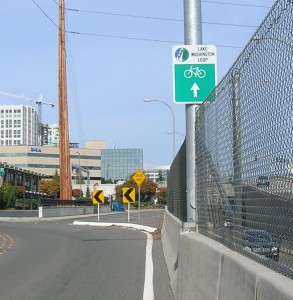 While riding down 114th Ave NE, near SE 2nd St, I spotted this amusing juxtaposition. Just in case you can’t tell from my terrible photography, there is a sign helpfully indicating that the bike route for the Lake Washington Loop is straight ahead. But from this angle, directly ahead of that sign is a “dead end” sign. Maybe this is a different definition of “loop” than I am accustomed to.
While riding down 114th Ave NE, near SE 2nd St, I spotted this amusing juxtaposition. Just in case you can’t tell from my terrible photography, there is a sign helpfully indicating that the bike route for the Lake Washington Loop is straight ahead. But from this angle, directly ahead of that sign is a “dead end” sign. Maybe this is a different definition of “loop” than I am accustomed to.
But the bike route actually does go down that road, which is only a dead end for cars, a short bike path connects the end of that street with 112th Ave right before the nightmare of 8th Street (more on that later).
However, in a city that considered bicycles real vehicles, there would be a sign below “dead end” which said “except bicycles.”
Here we are at 118th Ave SE, approaching SE 8th Street. The “motorcycles” warning sign wasn’t there last time I rode through here, otherwise you could more easily see the irony here. The small sign is a route marker for the Lake Washington Loop bike route, which helpfully indicates that the route is straight ahead. Of course the temporary warning sign is not just blocking the bike lane, but also obscuring the fact that it narrows down to nothing. Nothing says “bike route” like vanishing bike lanes.
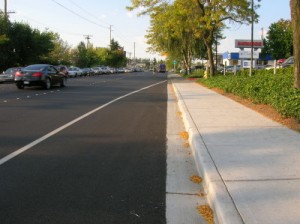 116th Ave NE is Bellevue’s “auto row”, and, ironically, has a nice wide bike lane along the uphill side of an otherwise rather busy four-lane street (though it only extends about 6 blocks). But then it is abruptly tapered down to nothing just before the intersection with the unbelievably hostile 8th Street (more on that in future posts). The red and grey sign on the right is for the local Hummer dealership whose driveway is right where the bike lane ends. So this is obvious attempt to make me turn right and trade in my bike for an SUV so that I will fit in more amongst the botox and silicone laden, cell-phone wielding, trophy wives in their Lexus SUVs who menace the streets of Bellevue.
116th Ave NE is Bellevue’s “auto row”, and, ironically, has a nice wide bike lane along the uphill side of an otherwise rather busy four-lane street (though it only extends about 6 blocks). But then it is abruptly tapered down to nothing just before the intersection with the unbelievably hostile 8th Street (more on that in future posts). The red and grey sign on the right is for the local Hummer dealership whose driveway is right where the bike lane ends. So this is obvious attempt to make me turn right and trade in my bike for an SUV so that I will fit in more amongst the botox and silicone laden, cell-phone wielding, trophy wives in their Lexus SUVs who menace the streets of Bellevue.
If you look at the Bellevue bike map, you’ll see 118th Ave marked as a bike route (the map does not distinguish bike lanes from bike routes as it would show how few of the former exist). After leaving downtown 118th Ave does have a couple miles of bike lanes. But at the intersection with SE 8th Street bicyclists are apparently expected to jump over the curb extensions on both sides of this intersection. So, mountain bikers will get a bit of jumping practice, but those of us on road bikes or recumbents are left in a position where we will undoubtedly have to stop and wait for traffic to clear, and, if the light is still green, proceed. A harsh reminder to bicyclists of their second-class status in the eyes of car drivers and road designers.
Are we at Gandhicon three yet? We now have two cases of anti-bike people demanding environmental reviews of facilities for bicyclists, one in San Francisco and one in New York City. (of course the supreme irony is that these people probably would have fought environmental reviews for car-oriented facilities). Whatever, I’m looking forward to Gandhicon four.